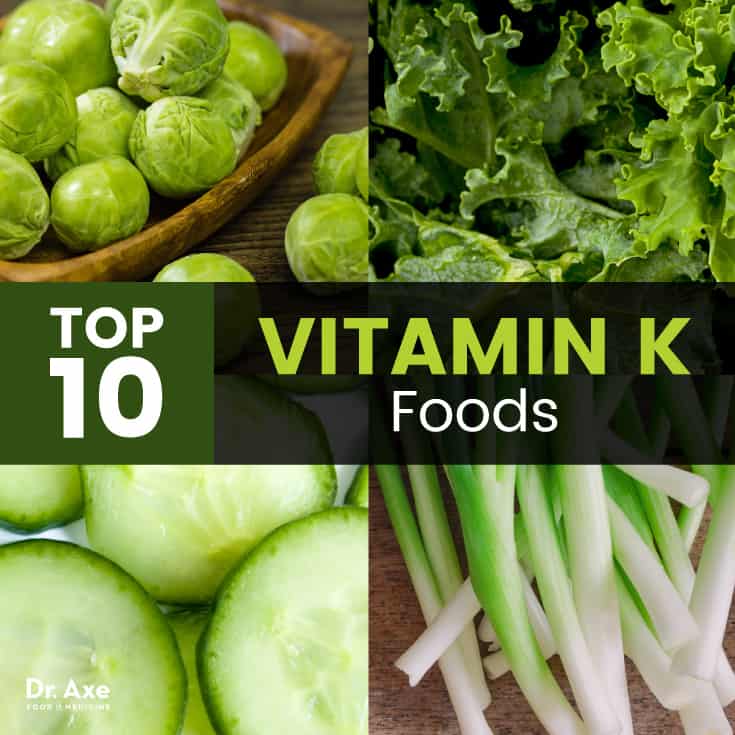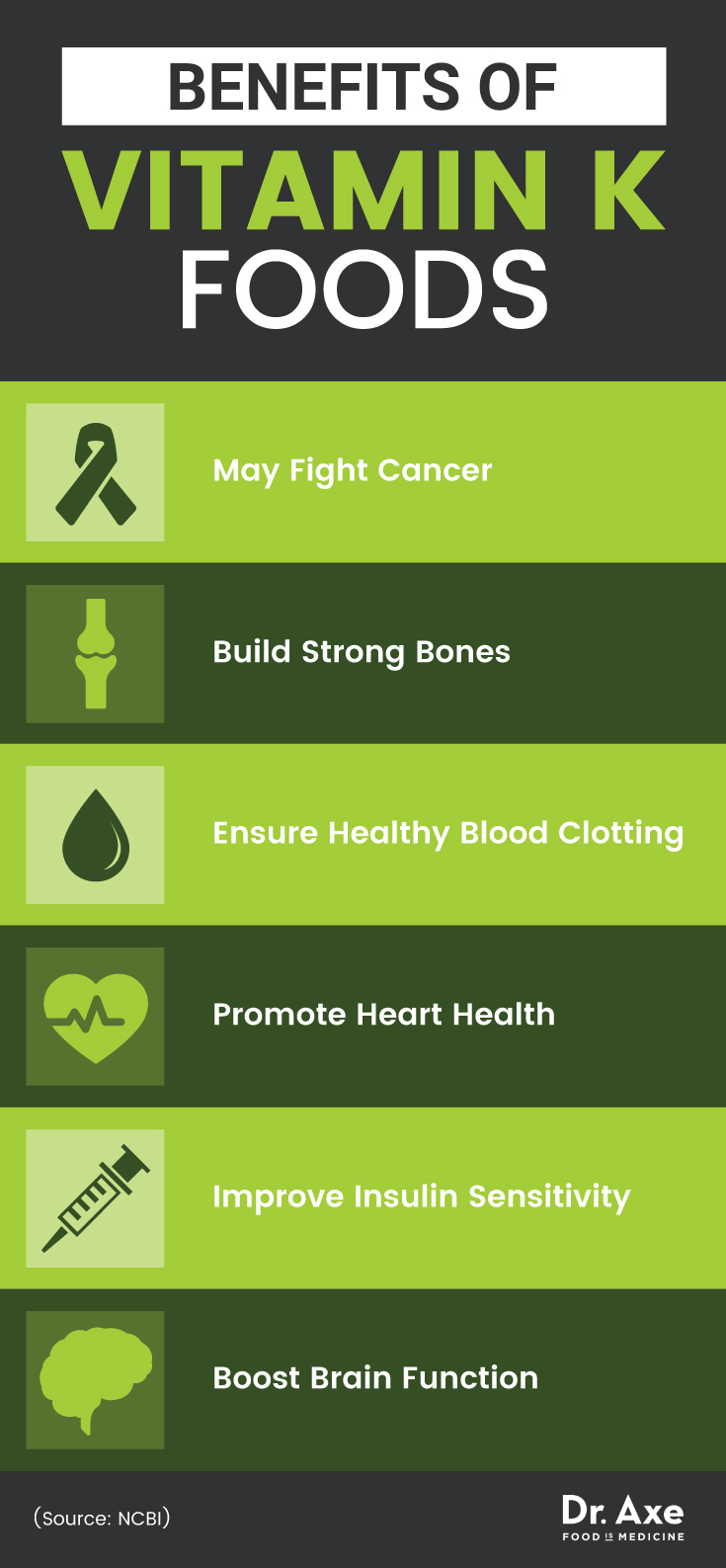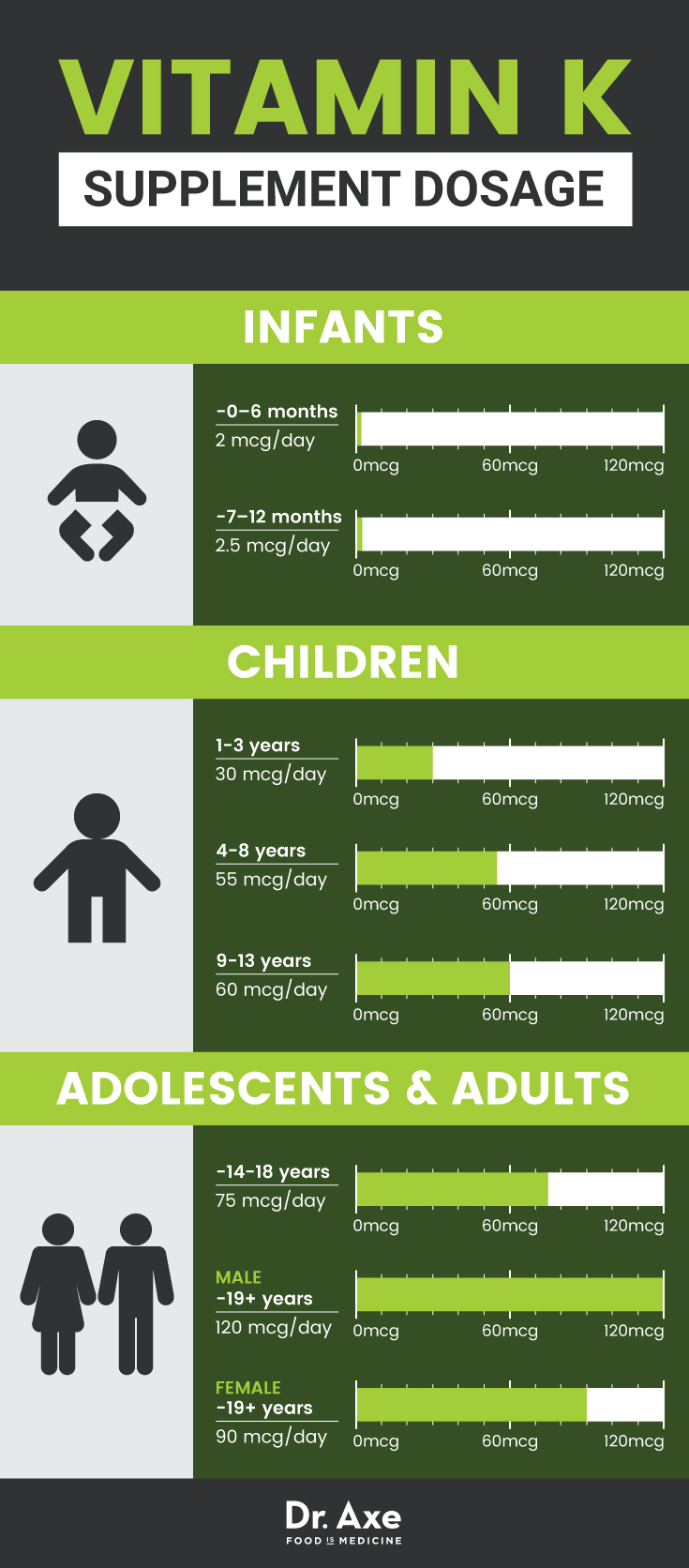Top 10 Vitamin K Foods & Benefits of Foods High in Vitamin K

By Rachael Link, MS, RD
Ready for yet another reason to eat your veggies? Leafy greens and vegetables like broccoli and cabbage are loaded with vitamin K, an important nutrient that’s been associated with improved insulin sensitivity, a reduced risk of cancer and improved heart health. Not only that, but vitamin K foods can also promote proper blood clotting and keep your bones strong. Oh yes, they also help keep vitamin K deficiency at bay.
Vitamin K isn’t just found in vegetables, though. It can also be found in certain types of fruit, meat, dairy and fermented foods and is even produced inside your own body by your good gut bacteria.
Getting enough of this vitamin is integral to health, and a deficiency can result in a long list of health problems. Keep reading to find out what you need to know about vitamin K and how you can ensure that you’re getting enough in your diet.
What Is Vitamin K?
Vitamin K is an important nutrient that plays a role in everything from bone metabolism to blood clotting.
It’s broken down into two main types: vitamin K1 (phylloquinone) and vitamin K2 (menaquinone). Vitamin K1 is the most common source of vitamin K present primarily in plant foods like leafy vegetables. Vitamin K2, on the other hand, is found in animal products and fermented foods. Foods high in vitamin K2 include meat, dairy and natto. Vitamin K2 is also produced by the beneficial bacteria in your gut microbiome.
On a healthy, well-balanced diet, a deficiency of vitamin K is rare. This is because it’s plentiful in whole foods, like vegetables. Ultra-processed foodsand refined sugars, on the other hand, are foods low in vitamin K. If these nutrient-poor foods make up a large part of your diet, it could mean you may not be getting enough vitamin K.
Vitamin K deficiency is very serious and can result in easy bruising, bleeding, tooth decay and weakened bones. For this reason, it’s crucial to ensure you’re including a serving or two of vitamin K-rich fruits and vegetables with each meal.
Top 10 Vitamin K Foods
Looking for a list of foods that contain vitamin K? This essential vitamin is found primarily in green vegetables, fruits, fermented foods and animal products, which makes it easy to meet your needs through a healthy and well-balanced diet. Here are a few of the top vitamin K foods:
- Green leafy vegetables, such as kale — ½ cup: 444 micrograms (over 100 percent DV)
- Natto (fermented soy) — 2 ounces: 500 micrograms (over 100 percent DV)
- Spring onions (scallions) — ½ cup: 103 micrograms (over 100 percent DV)
- Brussels sprouts — ½ cup: 78 micrograms (98 percent DV)
- Cabbage — ½ cup: 82 micrograms (over 100 percent DV)
- Broccoli — ½ cup: 46 micrograms (58 percent DV)
- Dairy (fermented) — ½ cup: 10 micrograms (10 percent DV)
- Prunes — ½ cup: 52 micrograms (65 percent DV)
- Cucumbers — 1 medium: 49 micrograms (61 percent DV)
- Dried basil — 1 tablespoon: 36 micrograms (45 percent DV)

Vitamin K Benefits and Benefits of Vitamin K Foods
- Fight Cancer
- Build Strong Bones
- Ensure Healthy Blood Clotting
- Promote Heart Health
- Improve Insulin Sensitivity
- Boost Brain Function
1. Fight Cancer
Some evidence has found that vitamin K could help kill off cancer cells and may even reduce the risk of cancer. In one study from the Department of Medicine, Division of General Internal Medicine at the University of Toronto, 440 postmenopausal women with weakened bones were supplemented with vitamin K1 for two years. Interestingly enough, taking vitamin K1 was associated with a 75 percent reduction in cancer incidence. (1)
Another study published in the American Journal of Clinical Nutritioncomprising 24,340 participants showed that a higher intake of vitamin K2 was associated with a reduced risk of cancer. (2)
Furthermore, many foods high in vitamin K also make the list of top antioxidant foods as well. Vitamin K foods like leafy greens are jam-packed with cancer-fighting antioxidants, which help prevent damage from free radicals and decrease the risk of cancer — making vitamin K foods some of the best cancer-fighting foods.
2. Build Strong Bones
Getting enough vitamin K in your diet is key to maintaining healthy bones. It is involved in bone metabolism and increases the amount of a specific protein that is required to maintain the calcium in your bones.
Several studies have found that increasing your intake of vitamin K can help reduce the risk of bone fractures. The study from the University of Toronto published in the journal PLoS Medicine mention above, for example, showed that supplementing with vitamin K1 cut the risk of fractures in half.
Another study out of the Jean Mayer U.S. Department of Agriculture Human Nutrition Research Center on Aging at Tufts University in Boston demonstrated that a low intake of vitamin K foods was associated with reduced bone mineral density in women. (3)
For this reason, many women at risk for osteoporosis often supplement with vitamin K. Other natural treatments for osteoporosis include weight training a few times per week, getting daily sun exposure and eating plenty of foods rich in omega-3 fatty acids.
3. Ensure Healthy Blood Clotting
Perhaps the most well-known vitamin K function is its role in promoting the formation of blood clots. Blood clotting is an important process that helps stop excess bleeding as a result of injury. In fact, one of the first warning signs of a vitamin K deficiency is bleeding from the gums or nose along with easy bruising.
For this reason, those on blood thinners like coumadin are recommended to moderate their vitamin K intake. Coumadin works against vitamin K to help slow blood clotting. Dramatic increases or decreases in vitamin K intake can interfere with and lower the effects of these medications.

4. Promote Heart Health
Besides ensuring healthy blood clotting, eating plenty of foods high in vitamin K may improve your heart health in other ways as well.
In a 2009 study published in the American Journal of Clinical Nutrition with 388 participants, vitamin K1 was found to slow the progression of coronary artery calcification in older adults. (4) Other studies have also confirmed the beneficial effects of vitamin K1 on vascular calcification, a condition in which calcium deposits build up in the arteries and cause blood vessels to lose elasticity. (5)
Coronary calcification is believed to be a strong predictor of coronary heart disease. (6) Increasing your intake of vitamin K foods can help prevent its progression to keep your heart healthy and strong.
5. Improve Insulin Sensitivity
Insulin is the hormone responsible for transporting sugar from the bloodstream to the tissues where it can be used as energy. When you have a diet high in sugar and carbs, your body tries to produce more and more insulin to keep up. Unfortunately, sustaining high levels of insulin can lead to a condition called insulin resistance, which decreases its effectiveness and results in high blood sugar.
Upping your intake of vitamin K may help with insulin sensitivity to help maintain normal blood sugar levels. A study published in the journal Diabetes Care showed that 36 months of vitamin K supplementation helped reduce the progression of insulin resistance in older men. (7)
In addition to including plenty of vitamin K foods in your diet, increasing your physical activity, keeping your carb intake under control and eating plenty of protein- and fiber-rich foods can also help stabilize blood sugar levels and prevent insulin resistance.
6. Boost Brain Function
Vitamin K plays an important role in the nervous system and is also believed to support healthy brain function. It is involved in the metabolism of sphingolipids, a class of compounds found in brain cell membranes that control motor and cognitive behavior. (8)
It also has anti-inflammatory properties and helps protect the brain against oxidative stress caused by free radical damage. Oxidative stress can damage your cells and may even lead to the development of conditions like Alzheimer’s disease and Parkinson’s disease. (9)
Vitamin K Foods Recipes
Ready to start incorporating more vitamin K-rich foods into your diet? Head over to the kitchen and give these delicious recipes a try:
- Kale Chips
- Crockpot Beef and Broccoli
- Cucumber Salad
- Baked Brussels Sprouts
- Stuffed Cabbage Rolls with Lamb
Vitamin K Supplements and Dosage
Although vitamin K is abundant throughout the food supply, it can also be found in supplement form as well. Vitamin K tablets are available and are often combined with other nutrients, such as calcium, magnesium or vitamin D. It is also usually present in most multivitamins as well.
Vitamin K supplements commonly use synthetic forms of vitamin K1 or vitamin K2. Studies show that these are well-absorbed in the body, but MK-7, the synthetic form of vitamin K2, has a longer half-life and remains active in the body for longer. (10)
If you do decide to take a vitamin K supplement, the amount you need may vary based on your age and gender. Here are the current established adequate intakes for vitamin K according to the National Institutes of Health: (11)
Infants
- 0–6 months: 2 micrograms/day
- 7–12 months: 2.5 micrograms/day
Children
- 1–3 years: 30 micrograms/day
- 4–8 years: 55 micrograms/day
- 9–13 years: 60 micrograms/day
Adolescents and Adults
- 14–18 years: 75 micrograms/day
- 19+ years: 120 micrograms/day for males, 90 micrograms/day for females

History
Vitamin K was first discovered in 1929 by Danish scientist Henrik Dam. He was performing a study investigating the role of cholesterol and found that feeding chicks a completely fat-free diet resulted in uncontrolled bleeding under their skin.
Thinking that the bleeding must be related to the absence of dietary cholesterol, he gave them a form of purified cholesterol, which did nothing to help. Finally, he was able to isolate the specific fat-soluble nutrient that was responsible for the coagulation of blood. Because it requires fat for absorption, the chicks had become deficient on the fat-free diet. He named it “vitamin K,” abbreviated from Koagulationsvitamin, which translates to “coagulation vitamin” in German.
American biochemist Edward Doisy continued Dam’s work and went on to uncover the chemical structure of vitamin K as well as the complex role that it plays in the body.
Both Doisy and Dam received the Nobel prize in 1943 for their work. In the years that have followed since, we have only just begun to unearth the wide range of functions vitamin K plays in the body, from boosting bone strength to improving heart health.
Precautions
Although vitamin K supplements are considered safe for most people, those who are pregnant and breastfeeding should avoid vitamin K supplements that provide an amount of vitamin K higher than the recommended daily allowance.
Additionally, if you have a history of stroke, cardiac arrest or issues with blood clotting, talk to your doctor before taking vitamin K.
If you are on blood thinners, you should not take a vitamin K supplement and need to moderate your vitamin K intake. Vitamin K and coumadin can interact, causing a decrease in the effectiveness of your medications. Consult with your doctor or dietitian if you have any concerns or need to discuss any vitamin K foods to avoid while on coumadin.
Vitamin K side effects are uncommon but can include a decrease in appetite, paleness, muscle stiffness or difficulty breathing. Discontinue use and talk to your doctor immediately if you experience any of these side effects.
Finally, keep in mind that too much vitamin K can also be harmful. For best results, stick to food sources of vitamin K and use supplementation only as directed to avoid adverse side effects.
Final Thoughts on Vitamin K Foods
- Vitamin K is an important vitamin that plays a central role in many aspects of health.
- There are two main types of vitamin K: Vitamin K1 is commonly found in plant foods as well as vegetables while vitamin K2 is in animal products and fermented foods like meat, dairy and natto.
- Including a serving of vitamin K food with each meal can help you easily meet your needs. Supplements are also available to boost intake if needed as well.
- Vitamin K has been shown to improve bone strength, promote heart health, increase insulin sensitivity, fight cancer, boost brain function and ensure healthy blood clotting.
No comments:
Post a Comment